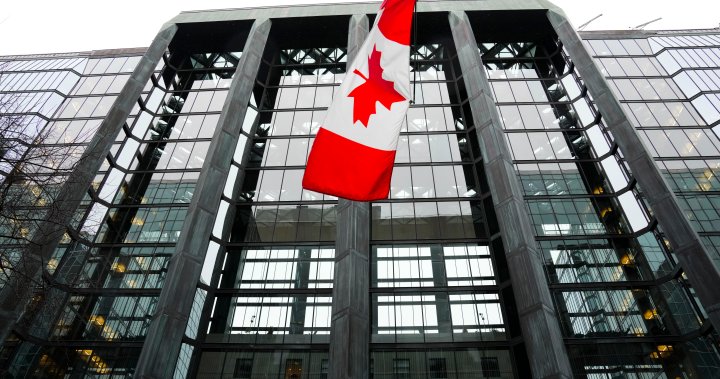Canadian households have gotten good news on the cost-of-living front so far in 2024, with monthly inflation figures showing prices are rising below three per cent annually for the first four months of the year.
Despite significant progress in the Bank of Canada’s efforts to bring annual inflation down to its two per cent target from the highs of 8.1 per cent nearly two years ago, a new survey released Thursday shows that Canadians are feeling more financial stress since that time.
FP Canada, an organization representing Canadian financial professionals, released its 2024 Financial Stress Index based on the findings of a Leger survey conducted in late February and early March.
Some 44 per cent of respondents said money is their leading source of stress, rising six percentage points from similar polling two years ago. Asked what was fuelling this anxiety, Candians point to higher grocery prices (up 69 per cent), inflation broadly (60 per cent) and housing costs (52 per cent.)
Ipsos polling conducted exclusively for Global News in April backs up the acute pinch consumers are feeling at the grocery store. Some 83 per cent of respondents to that poll said their weekly grocery bill has gone up over the past six months, by an average of $78.90.
Statistics Canada’s April inflation report released Tuesday showed further cooling in price pressures, with the overall annual inflation figure easing to 2.7 per cent from 2.9 per cent in March.
Slowing inflation at the grocery store in particular drove down the headline figure, with prices rising just 1.4 per cent annually across the aisles. Some categories, including fruits, nuts and seafood, even saw prices drop year to year.
But despite that recent easing, StatCan noted that grocery prices are up 21.4 per cent since April 2021. And rents are continuing to rise at a pace of 8.2 per cent year over year.
Rubina Ahmed-Haq, personal finance expert and host of For What It’s Worth on the Corus Entertainment radio network, tells Global News that it’s the cumulative impact of prices rising in such a short period of time that’s spurring financial stress.
Three years ago – when pandemic-fuelled price increases picked up steam – is still “recent memory” for most consumers, she says. Canadians can remember what housing and groceries cost them before the pandemic, and are still in the process of “rebuilding their lives” after the waves of disruption in recent years.
“We’ve just come out of three years of a pandemic where everything was upside down for a long time. People lost their jobs, lost their businesses,” Ahmed-Haq says.
“We saw interest rates go up faster than we’ve seen them go up in the last three decades. We saw inflation go up to the highest point it’s been since the 1980s. So a lot happened in a very, very short amount of time.”
Finance Minister Chrystia Freeland celebrated April’s lower inflation rate on Tuesday, noting that annual wage growth has outpaced inflation for the past 15 months. Last month, the average hourly wage rose 4.7 per cent year over year, a drop from 5.1 per cent in March.
But Ahmed-Haq says the increase in wages is a more recent phenomenon in the economic cycle, and most Canadians have not caught up to the sustained levels of high inflation seen at the peak in the summer of 2022.
Younger Canadians in particular are feeling the effects of financial stress, the Leger polling showed. Half of Canadians under the age of 35 report money as their top stressor, compared with 42 per cent for those older.
Financial news and insights
delivered to your email every Saturday.
This younger cohort is more likely to say financial stress was having at least one negative impact in their lives (72 per cent), with half saying they’ve faced anxiety, depression and other mental health challenges due to money worries.
Ahmed-Haq says the young adult generation in Canada likely grew up hearing their parents experience difficulties during the 2008 global financial crisis, and are now coping with their own challenges such as housing affordability.
These financial barriers are making the typical markers of adulthood that much harder to access, Ahmed-Haq explains.
“All these things are so much more difficult. So I think part of it is the psyche,” she says.
At the same time as overall inflation has been cooling, the Bank of Canada’s rapid interest rate hike cycle has made certain kinds of debt more expensive and raised housing costs for many.
Meghan MacPherson, a qualified associate financial planner, tells Global News that Canadians having to allot more of their monthly budgets towards debt payments is part of the rising stress.
“We were in a situation where it was very inexpensive to borrow, and then in a very short period of time, we got to a position where anyone with outstanding debt is seeing their payments rising substantially,” she says of the rate hike cycle.
The Financial Stress Index shows that a growing number of Canadians are feeling the need to catch up on their debt payments. Nearly one in four respondents to the poll (24 per cent) said they plan to pay off outstanding credit card debt within the next 12 months, five percentage points higher than in 2022. Debt repayment also tops those prioritizing a vacation in their upcoming list of expenses (19 per cent).
Those best-laid plans will face challenges in the face of the higher cost of living, Ahmed-Haq says. With rising day-to-day expenses and higher debt costs, Canadians may struggle to find the lump-sum payments they need to reduce or erase their loans, she says.
“We may be realizing that we need to pay our debt down, but many of us are not finding the extra money to actually do that,” she says.
Despite the growing financial stress, FP Canada’s Financial Stress Index reported that 91 per cent of those surveyed say they’re taking at least one action to reduce their concerns over the past year.
MacPherson says the best first step for most Canadians feeling overwhelmed by money problems is to start tracking their cash flow so they know which parts of their life are putting the most pressure on their finances.
Expense tracking was listed as the top action taken by 45 per cent of those surveyed, followed by 38 per cent who said they focused on debt repayment and 33 per cent who pointed to increased savings.
Ahmed-Haq says that for younger Canadians in particular, focusing on building up savings early and giving those dollars more time to compound can pay off in the long run. Cutting one dinner out with friends a month and trying to put away even a few hundred dollars at a time is a good way to start, she recommends.
“Time is on your side,” she says. “That is going to really pay off for you as you get older.”
MacPherson also says starting small is the best way to ensure changes in behaviour become “sustainable” in the long term.
”A lot of times when things go wrong or when plans aren’t sustainable, it’s because they’re taking on too much or trying to make too drastic of a change within their overall budget and financial situation,” she says.
There are signs that more Canadians see a light at the end of the tunnel, with 50 per cent of respondents to the polling saying they feel more hopeful about the financial future than the 47 per cent who said so last year.
Ahmed-Haq says “there’s always hope” that a financial situation will improve, but many households are still in the adaptation phase after the latest disruptions. For some, that means moving to more affordable communities and figuring out a financial situation that works in the post-pandemic realities, she says.
Canadians have endured economic upheaval for generations past and Ahmed-Haq says there’s no reason to think these latest hurdles will be any different.
“I don’t think that it’s hopeless,” she says.
“I think that we are just in a very acute time where everything has just happened very quickly, and we’re trying to figure out what our economy is going to look like for the next 10, 15 years.”




